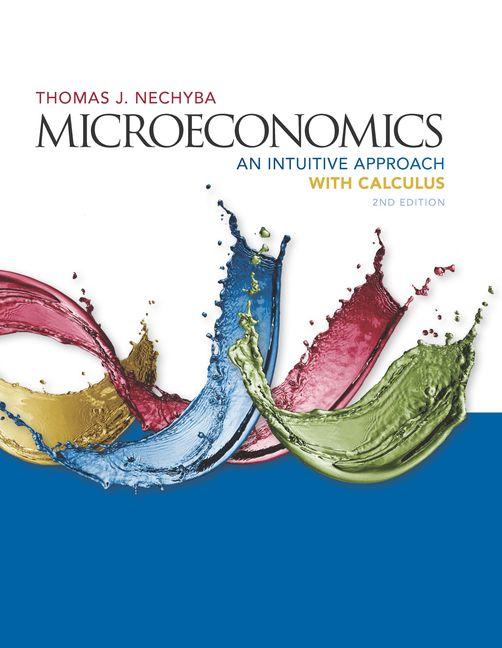Question
Question 1 (1 point) A call is said to be in-the-money when the strike price is _____ the market price; Question 1 options: Equal to
Question 1 (1 point)
A call is said to be "in-the-money" when the strike price is _____ the market price;
Question 1 options:
Equal to
Greater than
Less than
May be more than one of the above depending on the option premium
Question 2 (1 point)
Emily wrote an uncovered call option with an exercise price of $40 and received $300 for the contract. When the price of the stock reached $55, the call option holder decided to exercise the call. Ignoring commissions and taxes, what would Emily's dollar return on this investment be?
Question 2 options:
$(5,200)
$(1,200)
$(1,500)
$+1,800
$(1,800)
Question 3 (1 point)
Under what circumstances can the writer of a call option expect to profit?
Question 3 options:
Stock price declines
Stock prices remain the same
The increase in stock price is less than the premium
All of the above
Question 4 (1 point)
Caroline pays 15% taxes on dividends and capital gains and 35% taxes on ordinary income. Three years ago, she purchased 100 shares of XYZ, Inc. for $70. In January, Caroline wrote a six month put option on the stock at an exercise price of $90 and received $500. Three days after the purchase, the price of XYZ dropped significantly and has not been above $80 since. The result is that the put buyer chose not to exercise her put. Ignoring commissions, Caroline's tax on this transaction is
Question 4 options:
$650
$75
$325
$225
$175
Question 5 (1 point)
The premium paid by the buyer of an option is the maximum amount the buyer can lose even if the stock falls to zero. True or false?
Question 5 options:
True
False
Question 6 (1 point)
Hedging with options can give protection against loss or the stock protects the option against loss. True or false?
Question 6 options:
True
False
Question 7 (1 point)
Options are not an actual security. True or False?
Question 7 options:
True
False
Question 8 (1 point)
Last month when IBM was selling for $86, Dan purchased a call option on IBM with an exercise price of $90 for $2 per option or $200 total. Yesterday IBM closed at $95. Based on the minimum value of the contract, if Dan sells his call at yesterday's close, what would his return be?
Question 8 options:
4%
6%
50%
150%
250%
Question 9 (1 point)
The value of the put option will decrease in value as the share price falls. True or false?
Question 9 options:
True
False
Question 10 (1 point)
The strike price refers to the premium paid by the option buyer for the right to exercise the option. True or false?
Question 10 options:
True
False
Question 11 (1 point)
Henry pays 15% taxes on dividends and capital gains and 35% taxes on ordinary income. Five years ago, Henry purchased 100 shares of ABC, Inc. for $42 a share. Three months ago, Henry wrote a call option on the shares with an exercise price of $55 a share and received $1,000 for the contract. Yesterday, when the market price of the stock was $70, the call buyer exercised his option to purchase the shares from Henry. Ignoring commissions, what would Henry's taxes on this transaction be?
Question 11 options:
$345
$605
$570
$545
$805
Question 12 (1 point)
An American option may be exercised only at maturity. True or false?
Question 12 options:
True
False
Question 13 (1 point)
Kate owns 1,000 shares of Pills Drug Firm and has heard rumors that the firm is about to be investigated by the Food and Drug Administration (FDA). She believes the stock value will decline as this news becomes more widespread, but she also believes that this is a good company that can withstand any investigation. Kate should
Question 13 options:
buy a put
sell her shares
buy a call
buy a warrant
buy a bond issued by the firm
Question 14 (1 point)
Uses of options include
Question 14 options:
Possibility of hedging
Limiting exposure to risk
Profitability
all of the above are uses of options
A and C are uses, but B is not
Question 15 (1 point)
Factors that should be considered in taking a stock option position include
Question 15 options:
the anticipated direction of market movement
the volatility of the underlying stock
the time to expiration
all of the above are relevant factors in the option decision
the dividend paid on the underlying stock
Question 16 (1 point)
When index option is exercised, settlement is made by cash payment, not delivery of shares. True or false?
Question 16 options:
True
False
Question 17 (1 point)
An option provides a right to the writer and an obligation to the buyer. True or False?
Question 17 options:
True
False
Question 18 (1 point)
Option premium is used to describe the market price of option. True or false?
Question 18 options:
True
False
Question 19 (1 point)
The option writer determines when/if an option is exercised. True or False?
Question 19 options:
True
False
Question 20 (1 point)
Options are available on
Question 20 options:
market indices
exchanged traded funds
credit events
volatility indices
all of the above all of the above
Step by Step Solution
There are 3 Steps involved in it
Step: 1

Get Instant Access to Expert-Tailored Solutions
See step-by-step solutions with expert insights and AI powered tools for academic success
Step: 2

Step: 3

Ace Your Homework with AI
Get the answers you need in no time with our AI-driven, step-by-step assistance
Get Started


